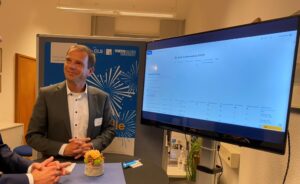On March 14, 2023 (*), RWTHmoodle will be updated to Moodle version 4.1. We have summarized all changes for our users on the info page.
But what is actually the story behind the change? For a look behind the scenes, we talked to the service manager of RWTHmoodle, Bernd Decker.
Editorial office: On 14.03.2023 (*) RWTHmoodle will be upgraded to the new Moodle version. What were the reasons – besides the more modern user interface – for the upgrade?
Bernd Decker: An important reason for the upgrade is that version 3.11 is only supported until November 2023. From then on, no more updates or security patches will be provided by the Moodle Headquartar. The Moodle community, which is an important part of our work, is also upgrading to Moodle version 4.1. So upgrading is essential for the work with our community partners.
Editorial office: Moodle’s user interface was already reworked in version 4.0. Why did you decide to upgrade with version 4.1?
Bernd Decker: We know from our experience that software is often not yet completely error-free after major upgrades. That’s why we waited for the first minor update of the new version. The community feedback from other universities that went directly up to Moodle version 4.0 confirms our strategy. In addition, Moodle HQ had announced that some promised features would not be released until version 4.1. Another important point is the support: Moodle version 4.1 is the first 4-version with LTS, i.e. Long Term Support. Support for version 4.0, on the other hand, only runs until November 2023. So, the next update would have been necessary this November.
Editorial office: It’s certainly difficult to find the right time for an upgrade like this. How did you decide on March 14, 2023 (*)?
Bernd Decker: We weighed the pros and cons for a long time, since there is of course no time of the year when RWTHmoodle is not in use. It quickly became clear to us that we would have to implement the changeover during the lecture-free period, since usage here is relatively low compared to the lecture period. We decided on the weeks before the summer semester of 2023. One important argument here was the time buffer: if we had planned to make the changeover for the winter semester of 2023/24, we would not have had any time to adjust our schedule due to the expiration of support.
Editorial office: You don’t do an upgrade on your own. Can you tell us who is involved?
Bernd Decker: In deed, many departments and people are involved in such a changeover. For example, our colleagues from operations who provide the servers. Then there are our developers and user experience experts, who adapt the Moodle version, which is provided by Moodle HQ, to the needs of the RWTH Aachen University. The IT-Service Desk is also involved, providing us with important input on the needs of our users. In addition, our marketing experts and the CLS, which advises the lecturers and also provides training, should be mentioned. And of course the Moodle community—we learn a lot from the experiences of other universities for our upgrade.
Editorial office: From your point of view, what are the biggest challenges of the upgrade?
Bernd Decker: The new version 4.1 was not released until November 2022, so we must follow a tight schedule overall until March 14, 2023 (*). In addition to the points already mentioned, such as finding a suitable upgrade date, we also have another big challenge: For the present range of functions in RWTHmoodle, we currently use about 120 plug-ins. Many of them are developed by the community. At the beginning of our planning, we therefore also had to keep an eye on whether these plugins would be further developed for version 4.1 and would continue to function as usual in the new version. So far, however, we do not expect any major problems here.
Editorial office: Our last question: What do you think is the best change with the new Moodle 4.1?
Bernd Decker: That’s hard to say. From my point of view, the best change is the new user interface. Even if our users first have to get used to it, I think it is much more clearly structured and intuitive.
Editorial office: Bernd, thank you for your answers and good luck with the changeover!
Responsible for the content of this article is Susanne Kubiak.





